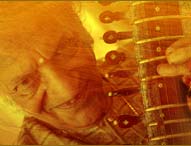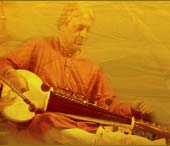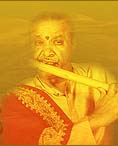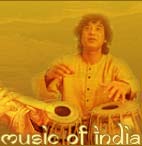Born On: July 6, 1930
Born In: Sankaraguptam, Andhra Pradesh
Career: Classical Vocalist
Nationality: Indian
With his mesmerizing music and charmingly deep voice extends, Balamurali Krishna is one of the pioneers of Carnatic music in India. Born to a family which has deep rooted relation with classical music, he inherited the legacy of music from his parents. He is not only a vocalist but also a proven versatile talent in creating countless magical compositions with musical instruments like mridangam, kanjira, voila, and violin. He is a legendary poet and musician, evident from several masterpieces composed in various languages. His musical concerts are exceptionally fascinating with his effortless singing style and fabulous control over the notes and ragas. His extraordinary vocal skills and accurate rendering of lyrics made him one of the most revered Carnatic musicians in India. With immense interest in learning all aspects of music, he is now researching on music therapy to learn about the healing attributes of music.
Early Life
Mangalampalli Balamurali Krishna was born in Sankaraguptam in East Godavari district of Andhra Pradesh. His father was a multi-faced musician with expertise in both vocal skills and musical instruments like flute, violin, and veena, while his mother was an excellent instrumentalist with the Veena. He was bought up solely by his father as he lost his mother in his early age. Getting to know about his son's strong desire towards music, Balamurali Krishna's father took him to formal training in Carnatic music under the tutelage of Sri Parupalli Ramakrishna Pantulu, a direct descendent of Saint Tyagaraja's (one of the trinity of Carnatic music) disciples. Young Balamurali showed exceptional talent in music that he conducted a complete concert at an early age of 8, at Tyagaraja Aradhana Festival (a famous music festival conducted in the reverence of Tyagaraja), in Vijayawada. Astonished with this young boy's performance, the famous Harikatha performer Musunuri Suryanarayana Murty Bhagavatar awarded the title Bala (child) and since then, he is known by the name Balamurali Krishna.
Career
Starting a career in music from an early age of 5, Balamurali Krishna mastered all 72 Melakartha ragas, the fundamental ragas of Carnatic music by the time he was 15 and even started composing Kritis (Carnatic songs). His book Janakaraja Manjari was published in 1952 and is used as a reference book by Carnatic music students and enthusiasts. These lessons were later recorded and released as 'Raaganga Ravali', a nine-volume series by Sangeetha Recording Company. He, thus, started his musical life and continues to be active in this field till date. His musical career is incomparable with over 25,000 concerts across the globe, including USA, Canada, UK, Italy, France, Russia, Sri Lanka, Malaysia, Singapore, and Middle East.
He carved out a distinctive niche with his unique way of rendering Carnatic composition through his mesmerizing voice. His excellent knowledge in music made him confident enough to try a new concept of jugalbandi (duet classical music performance of two solo musicians) and was the first person to conduct this type of concerts. He performed jugalbandis with Hindustani musicians like Pandit Bhimsen Joshi, Hariprasad Chaurasia, and Kishori Amonkar; thus, facilitating national integration through music. He gave his voice to many evergreen songs in his mother-tongue Telugu and composed songs in many other Indian languages, such as Kannada, Sanskrit, Tamil, Malayalam, Hindi, Bengali, and Punjabi.
Being keen to preserve the heritage in its original form, Balamurali Krishna retained the compositions of the trinities of Carnatic music (Saint Tyagaraja, Muthuswami Dikshitar, and Shyama Shastry) in its original version. He has also resurrected many compositions of great Carnatic musicians like Sri Bhadrachala Ramadasu and Sri Annamacharya. He served in All India Radio Vijayawada and Hyderabad as music producer and launched "Bhakthi Ranjani", an early morning show dedicated to devotional readings, whilst working as principal in Government Music College in Vijayawada. He got a transfer to Madras All-India radio station and thereafter, settled there and still continues to live there.
Contribution to Music
Balamurali Krishna has contributed to almost all categories of Carnatic music, like Varnams, Kirthis, Javalis, Thillans, and composed over 400 devotional songs in many languages, including Tamil, Telugu, and Sanskrit, based on the 72 fundamental Melakartha ragas. He has dedicated his life to learn about and experiment on Carnatic music and his research and experiments led to the creation of wonderful ragas like Ganapathi, Sarvashri, Mahati, Lavangi, Siddhi, Sumukham, Omkaari, etc., which stand for his search for new frontiers within Carnatic music. His experiments and innovations are not just limited to ragas but extend to talas (rhythmic patterns in Carnatic music). He has invented the concept of "Gathi Bedam" in the "Sa Sabdha Kriya" (actions that produce sound) part of the existing tala system. He has named his innovations in the tala system as Thri Mukhi, Panchamukhi, Saptha Mukhi, and Nava Mukhi.
Legacy
Balamurali Krishna is always keen to learn more about music and spread the knowledge amongst music aspirers. With a noble vision in mind to spread knowledge, he established the Academy of Performing Arts and Research in Switzerland, with its sister concern, the MBK Trust, dedicated to the development of art and culture and promote extensive research in music therapy. He is also a patron to a dance and music school Vipanchee, taken care by his trustee, Kalaimamani Saraswati.
Awards & Recognition
National Award for Best Playback Singer (1976)
Sangeetha Kalanidhi Award (1978)
Raja-Lakshmi Award by Sri Raja-Lakshmi Foundation (1980)
National Award for Best Music Director (1987)
Padma Vibhushan Award (1991)
Wisdom Man of the Year (1992)
Naada Maharishi by Nrityala Aesthetics Society (1996)
Chevaliers of the Ordre des Arts et des Lettres (honored by French Government in 2005)
Musician of the Century (2007)
Timeline
1930: Born in Sankaraguptam, East Godavari District, Andhra Pradesh
1938: Conducted a music concert at Tyagaraja Aradhana Festival, Vijayawada
1952: Published the book "The Janaka Raga Manjari"
1971: Honored with Padma Shri Award
1978: Presented the prestigious Sangeetha Kalanidhi Award
1980: Received the Raja-Lakshmi Award by Sri Raja-Lakshmi Foundation
1991: Conferred upon with Padma Vibhushan Award
1992: Bestowed with Wisdom Man of the Year
1996: Honored with Naada Maharishi by Nrityala Aesthetics Society
2005: Conferred Chevaliers of the Ordre des Arts et des Lettres by French Government
2007: Honored as Musician of the Century






